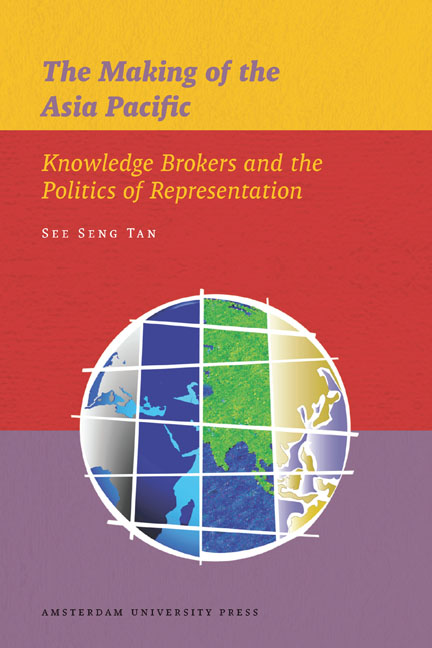Book contents
- Frontmatter
- Dedication
- Contents
- List of Tables
- Acknowledgements
- 1 Introduction: From ‘Pacific Asia’ to ‘Asia Pacific’
- 2 The Desire for Essence
- 3 Knowledge Networks as Agents of Representation
- 4 Representing the ‘Asia Pacific’
- 5 Representing Sovereign States
- 6 Representing the ‘In/Human’ Faces of Asia Pacific Security
- 7 Representing the ‘Authority’ of Knowledge Networks
- 8 Conclusion: A Plea in Three Parts
- Notes
- Bibliography
- Index
- Miscellaneous Ensmatter
7 - Representing the ‘Authority’ of Knowledge Networks
Published online by Cambridge University Press: 10 December 2020
- Frontmatter
- Dedication
- Contents
- List of Tables
- Acknowledgements
- 1 Introduction: From ‘Pacific Asia’ to ‘Asia Pacific’
- 2 The Desire for Essence
- 3 Knowledge Networks as Agents of Representation
- 4 Representing the ‘Asia Pacific’
- 5 Representing Sovereign States
- 6 Representing the ‘In/Human’ Faces of Asia Pacific Security
- 7 Representing the ‘Authority’ of Knowledge Networks
- 8 Conclusion: A Plea in Three Parts
- Notes
- Bibliography
- Index
- Miscellaneous Ensmatter
Summary
This study would not be complete if we did not revisit the question of modern political ‘non-state’ subjectivity and the attendant conceptual problems of such a perspective – a concern that returns us to the issue (considered in the first chapter) of knowledge brokers and entrepreneurs as epistemic agents. Rather than the problematic subjectivity of the sovereign state, we retrain the spotlight in this chapter on the security studies communities that socially construct the world of Asia Pacific security but whose subjectivity – as ‘rational’ and ‘legitimate’ interpreters and articulators of that same world ‘summoned’ to help policymakers make sense, assess and navigate the ‘unfamiliar terrain’ of the post-Cold War Asia Pacific – is also a construction. In other words, the presupposition of epistemic agents as exogenous to history and practice, even as modernity acknowledges their historicity, is equally suspect – a concern which returns us to the issue (considered in the second chapter) of whether constructivist approaches to Asia Pacific security truly focus on process and practice as they claim to.
In the preceding chapters, we have seen how Asia Pacific states are not the pre-established, self-evident entities that regional security discourses presume them to be. Instead, they are socially constituted effects produced via the interpretive and linguistic practices of individuals and institutions, not least the coterie of security intellectuals and practitioners who make up the region's knowledge networks. By focusing on the dialogical activities of these communities and national security establishments throughout the Asia Pacific, as I have sought to do in the preceding chapters, the analytical attention placed on these transnational communities and their members may, quite understandably, foster the impression that the argument being advanced here is that such epistemic agents constitute an unproblematic collective subject – a singular subject, more often than not – and blessed as autonomous origins of meaning and as ‘irreducible agents of history's making’ (Ashley 1988: 245). However, as we saw earlier, simply to aver that the historical and contemporary international structure of given sovereign states is but an effect that is always in the process of being constructed in history and through the representational practices of these ‘communities of practice’ (Adler 2005: 15) – only to leave things at that – is, at best, unsatisfactory and, at worst, smacks of ‘the rankest subjectivism’ (Fish 1980: 11).
- Type
- Chapter
- Information
- The Making of the Asia PacificKnowledge Brokers and the Politics of Representation, pp. 155 - 178Publisher: Amsterdam University PressPrint publication year: 2013



